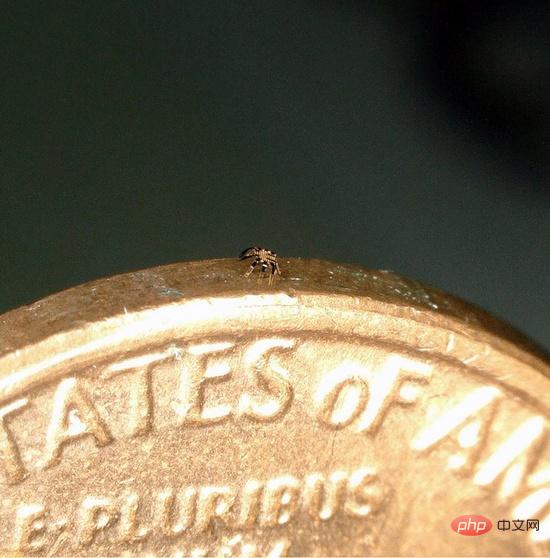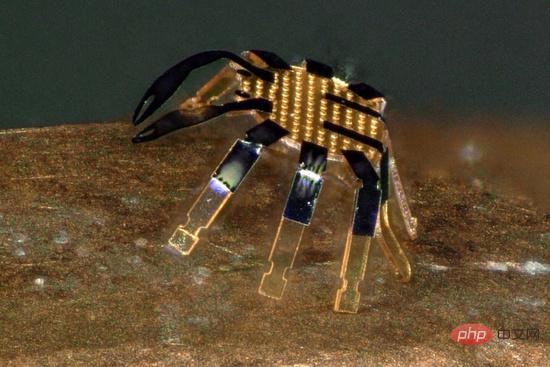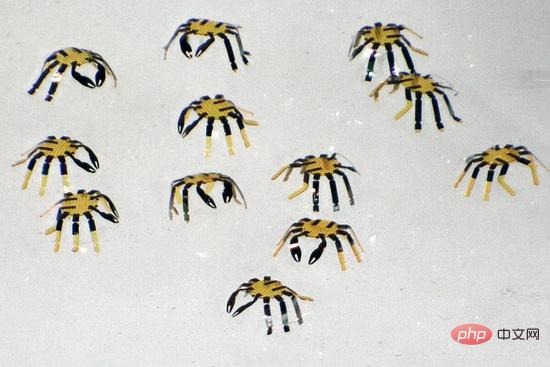Home >Technology peripherals >AI >Scientists demonstrate the world's smallest ever 'crab' remote-controlled walking robot, smaller than a flea
Scientists demonstrate the world's smallest ever 'crab' remote-controlled walking robot, smaller than a flea
- WBOYWBOYWBOYWBOYWBOYWBOYWBOYWBOYWBOYWBOYWBOYWBOYWBforward
- 2023-04-09 22:41:071574browse
Recently, engineers from Northwestern University in the United States developed the smallest remote-controlled walking robot ever, which appears in the form of a small and cute crab.
The tiny "crab" robot is only half a millimeter wide and can bend, twist, crawl, walk, turn and even jump without the need for hydraulics or electricity. IT House learned that the relevant research results were published in "Science Robotics".


According to reports, this kind of robot is made of shape memory alloy materials and can then change into the desired shape. You heat it and it changes back to its original shape, and when the heat disappears it can spring back to its original shape again.

According to reports, the heat is brought by laser. The laser heats the alloy through the crabs, but because they are so small, the heat travels very quickly, allowing them to respond astonishingly, even up to 10 times per second (repeatedly deforming). At the same time, the direction of the scanning laser determines the direction it moves—scan to the right, and the crab goes right (determined by the timing of the leg drive). The team was able to determine that their average speed was half their body length per second.

The researchers also tried a few different shapes, such as a water-walking tripod structure that can induce rotation by rotating a scanning laser, a coiled structure capable of small jumps, and others A structure capable of twisting and other movements.
The manufacturing process is very interesting - the team made the robot into a flat structure (heated state). They then bonded the flat structure to a stretched rubber substrate. The rubber then relaxes, shrinking the robot's pace and ejecting them from the surface in a controlled buckling process, bringing them into their final "cooling" position, where a glass coating is applied to hold them in place until heated.
"Robotics is an exciting field of research, and the development of microrobots is an interesting topic for academic exploration. John Rogers, who led the experimental work, said that this new technology can achieve a variety of objects. "Think of the new robot as a miniature version of a robot used in repair or assembly industries, or as a 'tiny' surgical assistant to help human doctors clear blocked arteries, stop bleeding, or eliminate cancerous tumors, all of which All are minimally invasive surgeries. ", that is to say, this kind of micro-robot is expected to become an important player in minimally invasive surgery in the future.
Dr. Huang Yonggang, who leads the basic theoretical work of the project, further explained: Our technology can achieve a variety of affected areas. "It's very challenging for ground robots to achieve this at such a small scale," he said. "

It's worth mentioning, why crab? "With these assembly techniques and material concepts, we can make walking robots of almost any size or 3D shape," "But the students found the crawling sideways movement very interesting," Rogers explained. This is a creative whim. ”
The above is the detailed content of Scientists demonstrate the world's smallest ever 'crab' remote-controlled walking robot, smaller than a flea. For more information, please follow other related articles on the PHP Chinese website!
Related articles
See more- Technology trends to watch in 2023
- How Artificial Intelligence is Bringing New Everyday Work to Data Center Teams
- Can artificial intelligence or automation solve the problem of low energy efficiency in buildings?
- OpenAI co-founder interviewed by Huang Renxun: GPT-4's reasoning capabilities have not yet reached expectations
- Microsoft's Bing surpasses Google in search traffic thanks to OpenAI technology

